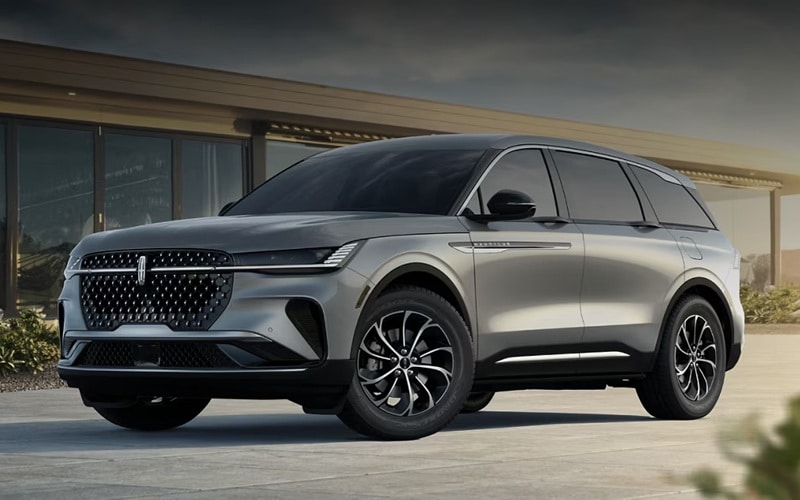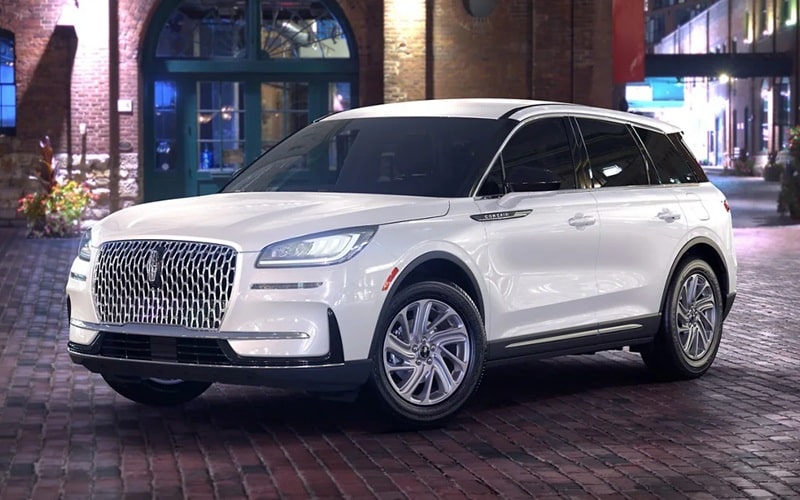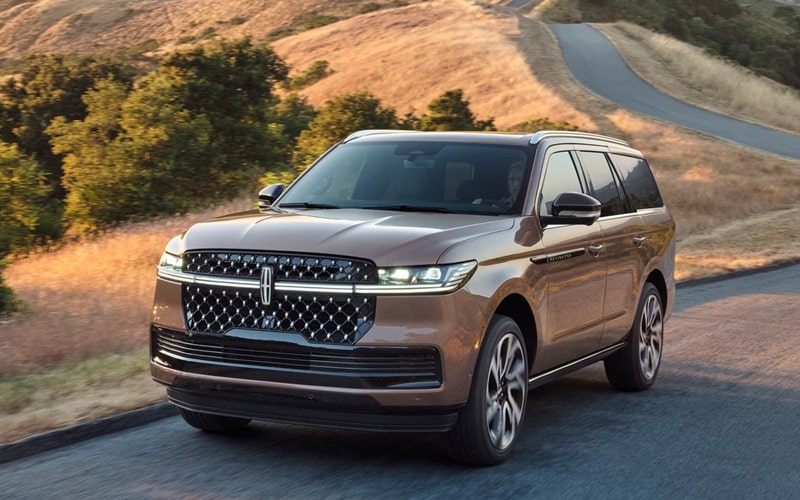Lincoln SUV Model Lineup by Fluids & Cooling System
The Lincoln SUV lineup continues to define the luxury segment, combining cutting-edge technology, versatile performance, and refined design. While elegant interiors and powerful drivetrains often capture attention, the sophisticated fluid systems that enable these vehicles to perform flawlessly deserve equal consideration. Corsair: Compact Sophistication The Lincoln Corsair may be the entry point to the Lincoln […]
The Lincoln SUV lineup continues to define the luxury segment, combining cutting-edge technology, versatile performance, and refined design. While elegant interiors and powerful drivetrains often capture attention, the sophisticated fluid systems that enable these vehicles to perform flawlessly deserve equal consideration.

Corsair: Compact Sophistication
The Lincoln Corsair may be the entry point to the Lincoln SUV lineup, but its fluid systems reflect the same engineering excellence found in larger models.
Engine Cooling System
The standard 2.0-litre turbocharged EcoBoost engine in the Corsair utilizes a pressurized cooling system with a capacity of approximately 9.5 litres. This system employs a 50/50 mixture of antifreeze and water, with Lincoln recommending Motorcraft Orange Antifreeze/Coolant for optimal performance.
The Corsair cooling system features an electronically controlled thermostat that more precisely regulates engine temperature compared to traditional mechanical thermostats. This advanced component helps the engine reach optimal operating temperature more quickly, improving fuel efficiency and reducing emissions during cold starts.
For the available Corsair Grand Touring plug-in hybrid model, the cooling system becomes more complex, incorporating a separate cooling circuit for the battery pack and power electronics. This secondary loop ensures optimal temperature management for the electrical components, critical for maintaining battery performance and longevity.
Transmission and Other Fluids
The 8-speed automatic transmission in the standard Corsair requires Motorcraft MERCON ULV fluid with a total capacity of approximately 9.0 litres. Unlike some older vehicles, this transmission is sealed and does not have a traditional dipstick for checking fluid levels.
The brake system uses DOT 4 Low Viscosity High Performance Brake Fluid, with a capacity of approximately 0.9 litres. Power steering is electronically assisted, eliminating the need for traditional power steering fluid.
The Corsair Grand Touring hybrid system adds complexity with its electronically controlled continuously variable transmission (eCVT), which requires a specialized fluid that should only be serviced by qualified technicians.
Nautilus: Midsize Refinement
The Lincoln Nautilus occupies the midsize segment in the Lincoln SUV lineup, offering refined, fluid systems designed for longevity and performance.
Engine Cooling System
With its standard 2.0-litre turbocharged four-cylinder engine, the Nautilus employs a cooling system with a capacity of approximately 9.7 litres. This system features a split cooling design that allows for independent temperature management of the cylinder head and engine block.
This sophisticated approach enables faster warm-up of the cylinder head during cold starts, improving combustion efficiency while simultaneously allowing the engine block to warm more gradually, reducing wear. The system utilizes a yellow-coloured coolant (Motorcraft Yellow Antifreeze/Coolant) with extended life properties.
For Lincoln SUV models equipped with the available 2.7-litre twin-turbocharged V6, the cooling system capacity increases to approximately 12.0 litres to handle the additional heat generated by this more powerful engine.
Transmission and Other Fluids
The 8-speed automatic transmission in the Nautilus requires Motorcraft MERCON ULV fluid with a total capacity of approximately 10.5 litres. This transmission features adaptive learning technology that adjusts shift patterns based on driving style, requiring precise fluid specifications to maintain proper operation.
The brake system uses DOT 4 Low Viscosity High Performance Brake Fluid with a capacity of approximately 1.0 litre. Like the Corsair, the Nautilus employs electronic power steering, eliminating traditional power steering fluid.
The all-wheel drive system requires approximately 0.7 litres of premium synthetic rear differential fluid and 1.2 litres for the power transfer unit. These fluids are specified to maintain consistent performance across extreme temperature ranges.
Aviator: Three-Row Technology
The Lincoln Aviator introduces more complex fluid systems to support its additional power and capability requirements.
Engine Cooling System
The standard 3.0-litre twin-turbocharged V6 engine in the Aviator features an advanced cooling system with a capacity of approximately 13.2 litres. This system incorporates dual electric cooling fans and a variable-speed water pump that adjusts flow based on actual cooling demands rather than simply engine speed.
This intelligent approach to cooling improves efficiency by reducing parasitic losses when maximum cooling isn’t required. The system uses Motorcraft Orange Antifreeze/Coolant premixed with deionized water to prevent scale and corrosion formation.
For the Aviator Grand Touring hybrid model, the cooling system becomes significantly more complex, with separate circuits for the engine, power electronics, and battery pack. The combined system capacity increases to approximately 19.5 litres across all circuits, with different fluid types for each subsystem.
Transmission and Other Fluids
The 10-speed automatic transmission in the Aviator requires Motorcraft MERCON ULV fluid with a total capacity of approximately 12.0 litres. This sophisticated transmission features adaptive shift scheduling and multiple driving modes, requiring precise fluid specifications to maintain its complex operation.
The brake system uses DOT 4 Low Viscosity High Performance Brake Fluid with a capacity of approximately 1.1 litres. For models equipped with the available Air Glide Suspension, an additional 0.5 litres of specialized suspension fluid is required for the air compressor system.
The all-wheel drive system in the Aviator requires approximately 1.7 litres of premium synthetic rear differential fluid and 1.5 litres for the power transfer unit. These specifications ensure proper operation of the vehicle’s advanced terrain management system.
Navigator: Flagship Fluid Systems
As the flagship Lincoln SUV, the Navigator features the most sophisticated fluid systems in the lineup, designed to support its substantial power, towing capability, and luxury features.
Engine Cooling System
The Navigator 3.5-litre twin-turbocharged V6 engine utilizes a high-capacity cooling system of approximately 15.0 litres. This system features a dual-thermostat design that allows for different temperature regulation between the cylinder heads and engine block, optimizing performance while minimizing wear.
The cooling system incorporates a heavy-duty radiator with enlarged passageways and dual electric fans that operate independently based on cooling demands. This design ensures adequate cooling even under extreme conditions such as towing at maximum capacity in hot weather.
The system uses Motorcraft Yellow Antifreeze/Coolant with a 10-year or 240,000-kilometre service interval when maintained properly. A secondary low-temperature radiator provides additional cooling for the transmission fluid and engine oil during high-load situations.
Transmission and Other Fluids
The 10-speed automatic transmission in the Navigator requires Motorcraft MERCON ULV fluid with a total capacity of approximately 13.2 litres. This heavy-duty transmission features specialized cooling and fortified internal components to handle the substantial torque output and towing capacity of the Navigator.
The brake system uses DOT 4 Low Viscosity High Performance Brake Fluid with a capacity of approximately 1.2 litres. The available Adaptive Suspension requires an additional 0.7 litres of specialized hydraulic fluid for proper operation.
For four-wheel drive models, the transfer case requires approximately 1.4 litres of Motorcraft MERCON LV fluid, while the front and rear differentials use premium synthetic gear oil with capacities of 1.7 and 2.6 litres, respectively. These specifications ensure proper operation of the sophisticated four-wheel drive system under all conditions.
The Verdict
The Lincoln SUV lineup demonstrates exceptional engineering through its sophisticated fluid systems. From the compact Corsair to the flagship Navigator, each model incorporates advanced cooling and lubrication technologies that support their luxury performance while maintaining long-term reliability.
Understanding these systems provides valuable insight for owners seeking to maximize their vehicle’s longevity and performance. The precise fluid specifications and maintenance intervals recommended by Lincoln ensure that these premium vehicles continue to deliver the refined experience expected from the brand.
Whether navigating urban streets or exploring scenic routes, Lincoln SUVs benefit from fluid systems engineered to the same exacting standards as their more visible luxury features. This holistic approach to engineering excellence exemplifies the Lincoln commitment to creating vehicles that deliver consistent, trouble-free luxury throughout their lifetime.
Five Facts About Lincoln SUV Fluid Systems
- The Lincoln Aviator Grand Touring hybrid uses a specialized cooling system with seven independent thermostats that manage different temperature zones throughout the powertrain, ensuring optimal operation of both combustion and electric components.
- The Lincoln yellow engine coolant contains organic acid technology (OAT) that provides corrosion protection for up to 240,000 kilometres without the phosphates and silicates found in conventional coolants, making it more environmentally friendly.
- The Navigator transmission fluid undergoes over 500 hours of high-temperature cycling tests during development—equivalent to approximately 240,000 kilometres of severe driving—to ensure it maintains viscosity and lubrication properties throughout its service life.
- Lincoln brake fluid is hygroscopic, meaning it naturally absorbs moisture from the air over time, which is why it requires replacement every three years regardless of kilometres driven, even if the fluid appears clean.
- The climate control systems in Lincoln SUVs use a specialized refrigerant oil that contains UV dye, allowing technicians to detect even microscopic leaks by examining the system under ultraviolet light during maintenance.
How do Lincoln SUV fluid systems impact ownership?
What makes Lincoln cooling systems different from those in non-luxury vehicles?
- These cooling systems feature more precise temperature management through additional sensors, electronic thermostats, and variable-speed pumps. These components allow for more granular control over engine operating temperatures, improving efficiency and reducing wear. The systems also typically include higher-capacity radiators with enhanced airflow patterns designed to maintain optimal temperatures even under demanding conditions like towing or driving in extreme temperatures.
How often should fluids be changed in Lincoln SUVs?
- Engine coolant should be inspected every 16,000 kilometres, but typically requires replacement at 240,000 kilometres when using the specified Lincoln coolants. Transmission fluid service intervals vary by model but generally range from 96,000 to 240,000 kilometres under normal driving conditions. Brake fluid should be replaced every three years, regardless of distance driven. For hybrid models, the power electronics coolant has a service interval of 160,000 kilometres.
What happens if incorrect fluids are used in a Lincoln SUV?
- Using incorrect fluids can cause significant damage to vehicle systems. Non-specified engine coolants may lack the corrosion inhibitors needed for aluminum components, leading to radiator and heater core damage. Incorrect transmission fluids can cause erratic shifting, overheating, and premature failure. The Lincoln electronically controlled systems are particularly sensitive to fluid specifications, with incorrect types potentially causing immediate performance issues and long-term damage.
How do hybrid Lincoln SUV models differ in their fluid requirements?
- They feature additional cooling circuits for the battery pack and power electronics that require specialized coolants with specific electrical properties. These models also use different transmission fluids compatible with their electrified systems. The maintenance of these additional systems requires specialized knowledge and equipment, making dealer service particularly important for hybrid models.
What climate factors affect Lincoln fluid systems?
- Extreme cold requires coolant with adequate freeze protection, typically to -40 degrees Celsius with the recommended 50/50 mixture. In extremely hot climates, cooling system efficiency becomes more critical, especially for turbocharged models like the Navigator and Aviator. The advanced climate control systems in Lincoln SUVs also use specialized refrigerants and oils that must be maintained at proper levels for optimal performance in all weather conditions.
*Disclaimer: Content contained in this post is for informational purposes only and may include features and options from US or international models. Please contact the dealership for more information or to confirm vehicle, feature availability.*


